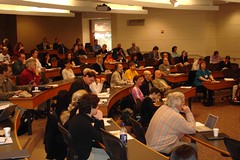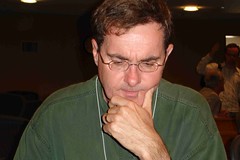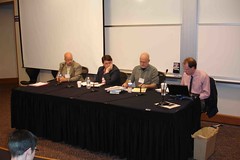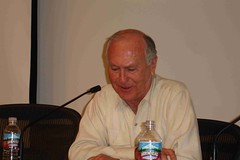 This past weekend I had the opportunity to attend and speak at the Human Enhancement Technologies and Human Rights (HETHR) conference at Stanford University in Palo Alto, California. The conference, which was sponsored by the Institute for Ethics and Emerging Technologies (IEET), the Center for Cognitive Liberty and Ethics (CCLE), and the Stanford Law School (SLC), brought together a diverse array of thinkers who spent the weekend ruminating over the challenging issues surrounding human enhancement.
This past weekend I had the opportunity to attend and speak at the Human Enhancement Technologies and Human Rights (HETHR) conference at Stanford University in Palo Alto, California. The conference, which was sponsored by the Institute for Ethics and Emerging Technologies (IEET), the Center for Cognitive Liberty and Ethics (CCLE), and the Stanford Law School (SLC), brought together a diverse array of thinkers who spent the weekend ruminating over the challenging issues surrounding human enhancement. The central focus of the conference was to construct a case for human enhancement based upon the lofty principles of human rights, liberalism and bodily autonomy. The event was in no small way a direct challenge to the burgeoning anti-enhancement camp that has arisen in recent years to combat what is perceived to be a threat to human dignity and humanity itself. Organizers of HETHR hoped that the conference would demonstrate that a viable and compelling case could be made in favour of enhancement. Based on what I heard at the event, I would say it was mission accomplished.
First, the caliber and credentials of the speakers was excellent – one of the strongest set of panels and panelists I've yet seen at such a conference. Attendees and speakers came from as far away as Australia and Europe and were comprised of academics, activists, journalists and the curious. And tellingly, the conference crowd was a fair mixture of men and women, young and old, and included some visible minorities – a far cry from the young white male crowd that came to dominate similar events only a few years ago.
Second, the arguments and legal frameworks supporting the issue of biotechnological enhancement are most certainly beginning to crystallize and take root. The human enhancement debate is in the process of maturing – a development that will end with the normalization of enhancement discourse in bioethics circles and eventually within society itself. As evident throughout the conference, the ethical and legal frameworks necessary to uphold human rights and enable the responsible development and application of enhancement technologies are very much under construction.
 Such a conference would have been unlikely only a few years ago. Quite obviously, issues surrounding changes to human reproduction, morphology and cognition are highly contentious -- a swarm of sensitive issues that has thrown traditional left-right politics completely off kilter. As Reason science correspondent Ronald Bailey noted during his presentation, our pending transition to a self-modifying species will be the key political issue of the 21st century.
Such a conference would have been unlikely only a few years ago. Quite obviously, issues surrounding changes to human reproduction, morphology and cognition are highly contentious -- a swarm of sensitive issues that has thrown traditional left-right politics completely off kilter. As Reason science correspondent Ronald Bailey noted during his presentation, our pending transition to a self-modifying species will be the key political issue of the 21st century. Just prior to the event word got out to the Stanford brass that an enhancement themed conference was to be held at the Law School. They reacted by trying to shut it down. I suspect that the Stanford folk were not only wary of a potential 'crank' factor (the Singularity Summit was similarly unjustly singled out two weeks prior), but of the sensitive subject matter as well.
But it was through the diligent and persuasive lobbying of conference organizer Henry Greely, the director of the Stanford Center for Law and the Biosciences, that the conference was allowed to continue. Techprogressives can be thankful that it did, as a cancelled conference would have been a decisive victory for the bioconservative camp.
Clearly affected by the hard struggle to keep the conference alive, Greely’s introductory talk was a plea for people to remain open-minded and to respect the freedom of academic discourse no matter how controversial the subject matter might initially appear to be.
Once the conference got underway it was obvious that the participants took heed of Greely's words. What followed over the course of the weekend was a spirited and tolerant atmosphere in which attendees did not have to feel shackled by stifling political correctness, established ethical and philosophical conventions, or constraining visions of the future.
 Moreover, by giving the three key sponsors an equal opportunity to mould the event, HETHR never came to be dominated by any one set of priorities or visions. For example, members of the IEET, a techprogressive think-tank run by bioethicist and HETHR organizer James Hughes, provided the decidedly future-tech perspective. This angle was tempered by the groundedness of the Law School and by the activistic and socially hip work of the CCLE -- a group directed by the charismatic duo of Wrye Sententia and Richard Boire. Consequently, the presentations were in tune with some of the more profound implications of pending GNR technologies (e.g. radically extended lives, AI, virtual persons, animal uplift, etc.), while intermixed with the practical realities of law, politics and civil rights.
Moreover, by giving the three key sponsors an equal opportunity to mould the event, HETHR never came to be dominated by any one set of priorities or visions. For example, members of the IEET, a techprogressive think-tank run by bioethicist and HETHR organizer James Hughes, provided the decidedly future-tech perspective. This angle was tempered by the groundedness of the Law School and by the activistic and socially hip work of the CCLE -- a group directed by the charismatic duo of Wrye Sententia and Richard Boire. Consequently, the presentations were in tune with some of the more profound implications of pending GNR technologies (e.g. radically extended lives, AI, virtual persons, animal uplift, etc.), while intermixed with the practical realities of law, politics and civil rights. The conference, then, was never dominated by the technorapturesque mood that has come to characterize similiar events. It was truly a conference for ethicists by ethicists – many of whom were openly critical and frustrated with their own departments and with what they have come to perceive as the unrealistic and flawed bioconservative streak that comprises a significant part of mainstream bioethics today.
Indeed, the conference itself was an amazing showcase for ethical discourse. Panelists reached deep into their methodological tool kits to find support for their various cases; names that consistently rang out throughout the conference included Plato, Aristotle, Socrates, Aquinas, Kant, Locke, Rawls and Singer. Key ethical concepts and concerns that were regularly tossed into the fray included issues of egalitarianism, utilitarianism, contractarianism, cultural relativism and even Buddhism and transhumanism. Debates centered around issues of primary versus positional goods, therapy versus enhancement, identity and authenticity, what it means to be 'normal', liberty, justice and human rights itself. Even those ethicists critical of human enhancement, including William Hurlbut and Nigel Cameron, refrained from regressing to tired conservative and religious arguments, instead opting to directly challenge and critique the various pro-enhancement positions; it was dialog rather than shouting, debate rather than hysteria.
 Among the many highlights of the conference, a poignant moment came during Walter Truett Anderson's presentation. Anderson, a forward thinking enviro-realist, reminded the audience that as we stand at the eve of human enhancement the body is still a system that operates within a larger system. Part of the coming challenge, he argued, is to look at human enhancement in the context of the environment and the planet itself.
Among the many highlights of the conference, a poignant moment came during Walter Truett Anderson's presentation. Anderson, a forward thinking enviro-realist, reminded the audience that as we stand at the eve of human enhancement the body is still a system that operates within a larger system. Part of the coming challenge, he argued, is to look at human enhancement in the context of the environment and the planet itself.At the same time, however, Anderson also issued a challenge to traditional environmentalists. Quoting environmentalist pioneer George Perkins Marsh, he noted that "humans change things.” This observation, he said, is very much a part of the human condition. It's a lesson that Anderson believes most environmentalists have yet to learn. In this increasingly networked age, and as the planet becomes progressively wired along with it, environmentalists must realize that humanity cannot enforce a hand's off policy with regards to the planet. Whatever environmental aspect is altered and managed on Earth, it will be the result of our guiding hands. Such changes will be indistinguishable from what we consider to be 'natural' today. Anderson declared that we are poised to deliver the planet into its next phase of evolution.
The analogy to human enhancement and our increasing control over the 'human system' was not lost on the audience. Indeed, contrary to what many bioethicists would have, we cannot expect to exert a hand's off policy to the human body. Yes, humans change things. They change the environment. They will change themselves.
Like our approach to the environment, the changes that we will make to ourselves will eventually prove to be both desirable and necessary. And like the future of Earth, it will represent the next phase in our own evolution.
In the meantime, conferences like HETHR will serve as the sounding boards and springboards to a prosperous, fulfilling and dignified future for all.

t was dialog rather than shouting, debate rather than hysteria.
ReplyDeleteIndeed! This was one thing that helped make the conference truly worthwhile; there was evidence of thoughtfulness rather than zealotry, and this certainly helped to let critical information and questions come out (as opposed to having them get lost in the static of meaningless emotional argument).
Good job on the writeup -- I'm wondering if anyone has started attempting to compile a list of blogs pertaining to the HETHR event. I was thinking of trying to do it myself, but I figured I'd see if someone is already doing this.